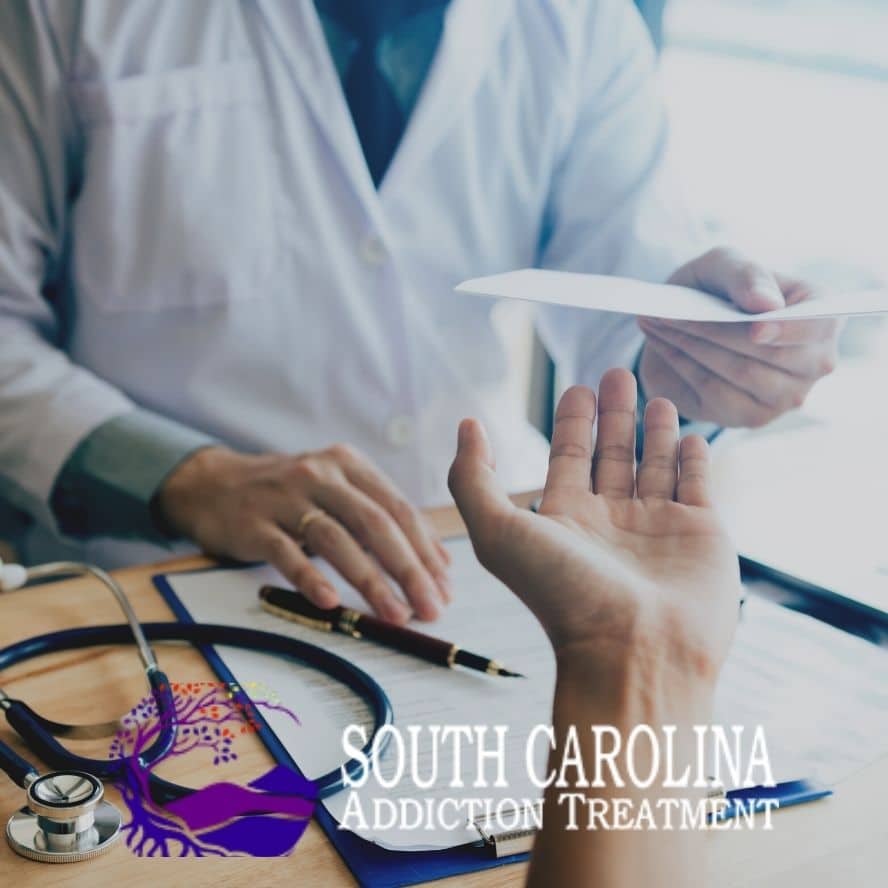Medication-Assisted Treatment (MAT) in South Carolina

Medically Verified: 2/1/24
Medical Reviewer
Chief Editor

All of the information on this page has been reviewed and verified by a certified addiction professional.
Over the last two decades, the opioid crisis has continued to progress. Last year (2020) was the deadliest year on record for drug overdose deaths–the majority of which involved synthetic, illicit, and prescription opioids.[1]
Unfortunately, very few people who struggle with opioid addiction receive the help they need to achieve a sober lifestyle. Even those that do face unpleasant withdrawal symptoms and intense drug cravings that make recovery difficult. According to the National Institute on Drug Abuse, relapse rates for people who seek substance abuse treatment are between 40-60%.[2]
In the past, addiction was primarily treated using behavioral therapies and lifestyle changes. However, research has shown that approaches that utilize a combination of medication and therapy can successfully treat substance use disorder. Rehabilitation approaches that combine medication and therapy are referred to as medication-assisted treatment (MAT).
What is Medication-Assisted Treatment (MAT)?
Medication-assisted treatment (MAT) involves the use of prescription medications, counseling, and behavioral therapy that provides a highly individualized, whole-patient approach.[3] It uses the same therapies as traditional addiction treatment, but also incorporates FDA-approved medications.
MAT is generally reserved for patients who struggle with an addiction to opioids or alcohol. The medications used help normalize brain chemistry, block the euphoric effects of opioids and alcohol, alleviate cravings, and regulate body functions. By helping patients feel more mentally and physically stable, medications allow them to focus on therapy sessions, recovery-related activities, and personal healing rather than thoughts of drug or alcohol use.
Who Should Go to Medication-Assisted Treatment in South Carolina?
MAT isn’t right for everyone. The ideal candidate for medication-assisted treatment in South Carolina is someone who has a moderate to severe dependence on alcohol or opioids and is willing to go through treatment.
Under federal law 42.CFR 8.12, patients receiving opioid treatment medications must also be receiving counseling and behavioral therapy.[6] Patients who are not willing to go to counseling, or those who want to rely solely on medication to recover, are not a good fit for MAT.
If you or a loved one are addicted to alcohol or opioids and think MAT may be right for you, call now to speak with one of our dedicated admissions coordinators in South Carolina.
What Medications Are Used?
The United States Food and Drug Administration (FDA) has approved several medications that can treat opioid and alcohol use disorders. These medications are evidence-based and are not merely a substitute for another type of drug. When combined with a comprehensive treatment program involving counseling, behavioral therapy, and peer support, the medications used in MAT can be highly effective.[4]
Opioid Use Disorder Medications
Methadone, buprenorphine, and naltrexone are the three medications the FDA has approved for the treatment of opioid use disorder.
- Methadone – an opioid agonist that eliminates drug cravings and alleviates opioid withdrawal symptoms. It is sold under the brand names Methadose and Dolophine.
- Buprenorphine – a partial opioid agonist-antagonist that blocks and partially activates opioid receptors to treat opioid withdrawal and reduce cravings. Buprenorphine is sold under the brand names Subutex and Sublocade (extended-release injection). It is also combined with naloxone, an opioid overdose prevention medication, in some formulations, such as Suboxone, Cassipa, Zubsolv, and Bunavail.[5]
- Naltrexone – an opioid antagonist that blocks the effects of opioid drugs and reduces drug cravings. It is sold in pill form under the brand name ReVia and also as a monthly injection called Vivitrol.
Alcohol Use Disorder Medications
Alcohol treatment medications are primarily used after patients have detoxed from alcohol. These include acamprosate, disulfiram, and naltrexone.[4]
- Acamprosate (Campral) – a medication that reduces the desire to drink alcohol.
- Disulfiram (Antabuse) – a medication that reduces the motivation to drink by producing sickness in people who drink while taking the medication.
- Naltrexone (Revia, Vivitrol) – an opioid antagonist that helps normalize brain chemistry and alleviate alcohol cravings.
What are The Benefits of MAT?
There are many ways patients can benefit from medication-assisted treatment in South Carolina. Not only do these medications help treat withdrawal symptoms and cravings, but they also enable patients to focus all of their attention and energy on their personal healing process.
According to SAMHSA, MAT has been proven clinically effective. It also significantly reduces the need for inpatient detoxification and treatment services.[3]
Other advantages of MAT include:
- Fewer relapses and drug overdoses
- MAT patients are more likely to complete treatment than their counterparts
- Decreases illicit opioid use and criminally related behaviors
- Can improve a person’s ability to gain and maintain employment after rehab
- Improves birth outcomes in pregnant women struggling with substance use disorder
- May reduce the risk of transmitting blood-borne illnesses like HIV/AIDS and Hepatitis C
By giving patients these advantages, MAT is thought to provide a more comprehensive and whole-patient approach compared to traditional treatment methods.
Find out if Medication-Assisted Treatment in South Carolina is Right For You
You should never start using any of the medications mentioned here without obtaining a prescription from your doctor. MAT does not come without risks, so it’s important to only take these medications as directed and when involved in an addiction treatment program.
If you or a loved one are interested in learning more about medication-assisted treatment in South Carolina, give us a call today. Our trusted admissions counselors are eager to help you begin your recovery journey.
References:
- https://www.cdc.gov/nchs/nvss/vsrr/drug-overdose-data.htm
- https://www.drugabuse.gov/publications/drugs-brains-behavior-science-addiction/treatment-recovery
- https://www.samhsa.gov/medication-assisted-treatment
- https://www.samhsa.gov/medication-assisted-treatment/medications-counseling-related-conditions
- https://www.fda.gov/drugs/information-drug-class/information-about-medication-assisted-treatment-mat
- https://www.ecfr.gov/current/title-42/chapter-I/subchapter-A/part-8#8.12

